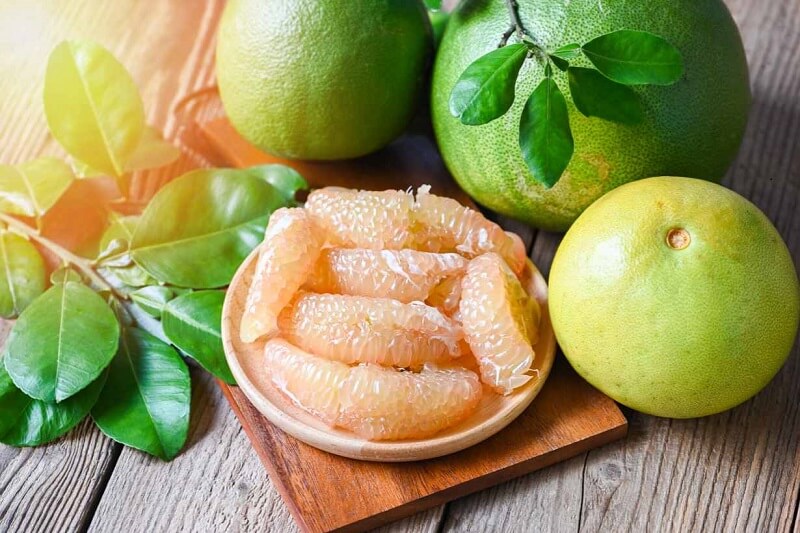Dear Readers, Pomelos are not only true giants among citrus fruits, but they also provide a whole lot of vitamins and minerals.
And that, although the fruit did not exist until 40 years ago.
You can find out everything you need to know about the health benefits of pomelo and tips on buying and peeling fruit from us.
It is closely related to the grapefruit and the pomelos, but it has slightly different properties: The pomelo is not only a real vitamin C bomb, but it also has a much milder taste than its bittersweet relatives.
Things to know about Pomelos
Strictly speaking, the pomelo is not a separate species, but a different variety of the grapefruit.
The citrus fruits known as pomelos basically belong to the grapefruit, Latin Citrus maxima.
Nevertheless, the pomelos have slightly different properties, and they still score with their significantly milder taste.
Pomelo is the name given to the new breed of grapefruit and grapefruit that was created in Israel around 1970.
The grapefruit itself is a cross between grapefruit and orange – this citrus fruit is known in particular for its enormously high vitamin C content.
In the years that followed, other pomelo breeds emerged, for example in South Africa and China.
The honey pomelo, which comes from Asia, is particularly popular. No wonder, after all, it has the highest sugar content, which makes it correspondingly sweet.
Pomelo tree and fruits
The evergreen pomelo tree can grow up to 15 meters tall and loves a warm, frost-free climate.
Its fruits the pomelos are real heavyweights among citrus fruits, weighing between 500 and even 2000 grams.
They grow to an average of 15 to 25 centimeters.
However, a lot of the weight and size are due to the shell and the almost finger-thick white layer underneath.
Pomelos are pear-like in shape, with the skin ranging in color from white-yellow to greenish.
This is usually completely removed before consumption because the bitter substances it contains make the fruit inedible for many consumers.
Healthy Ingredients and Effects of Pomelo
Similar to other citrus fruits, pomelos are an excellent source of vitamin C.
The bittersweet fruits can also score with other nutrients that have a positive effect on the body and health.
In this chapter, we will explain the individual health benefits and what makes pomelo so healthy.
Low calorie
With only 25 to 50 calories for 100 grams of fruit, the pomelo is truly low in calories.
It is therefore an ideal snack for anyone who wants to pay attention to their energy intake as part of a diet or when changing their diet.
At the same time, you don’t have to do without your sweet snack in between.
In addition, the exotic new breed has hardly any carbohydrates, which is why it is also suitable for a low-carb or keto diet.
You can find out how you can continue to lose weight healthily or quickly on the respective pages.
High vitamin C content
In terms of vitamin C, it cannot compete with its closest relative, the grapefruit.
Nevertheless, the pomelo provides a considerable amount of it.
100 grams of fruit contain between 40 and 60 milligrams of the vital vitamin.
The same amount of pomelo already covers 40 percent of the daily requirement of an adult.
The fruit also contains certain plant substances that improve both the absorption and the utilization of vitamin C in the body.
The human body needs vitamin C for numerous functions and processes. Among other things, it is involved in various metabolic processes and is required for the development of collagen, connective tissue, as well as for bones and teeth.
The essential vitamin continues to support the immune system in its functions and is therefore of great importance, especially in the winter months.
Vitamin C also has an antioxidant effect: it prevents damage to cells by so-called free radicals.
Smokers are dependent on an increased vitamin C intake.
For healthy digestion
The outer skin of the pomelo pulp contains a considerable amount of the bitter substance limonine.
This causes the extremely bitter taste of the peel but is quite healthy.
Limonine stimulates intestinal activity and thus supports healthy digestion.
However, limonine is not only found in pomelos, many other citrus fruits also have the beneficial bitter substance.
Lots of potassium
In addition to vitamin C, pomelos provide a considerable amount of the bulk element potassium.
The daily requirement for potassium is extremely high at almost 4,000 milligrams.
The exotic grapefruits thus provide a good source for partial coverage.
The human body depends on potassium in various ways.
Among other things, the bulk element keeps the acid-base balance in balance, regulates blood pressure, and is responsible for the normal functioning of nerves and muscles.
Conversely, a persistent potassium deficiency can lead to a series of negative effects: Among other things, it can lead to paralysis and dangerous cardiac arrhythmias.
Potassium also reduces inflammation in the body. This property, combined with the calcium and vitamin C contained in the pomelo, makes the fruit a true immune system booster.
To prevent certain types of cancer
The bitter substance limonin contained in pomelos not only ensures healthy digestion.
Scientific studies found that the substance continues to have a preventive effect on certain types of cancer.
This is due to their anti-inflammatory properties.
Under certain circumstances, these can reduce the growth of cancer cells in the breast as well as in the uterus.
To lower blood pressure
Other scientific studies have found other positive effects of limonine.
The bitter substance has been shown to lower blood pressure in people with metabolic syndrome.
Thus, this counteracts a symptom of the clinical pictures.
However, this study only carries out on rats, which on the one hand suggests a similar effect on humans, but has not been proven with certainty.
Due to its numerous healthy ingredients, the pomelo can’t hurt in any case. Caution is only required if certain medications are being taken at the same time.
Disadvantages and risks of Pomelos
Despite the numerous health benefits and ingredients of pomelo, there are a few factors to consider.
In the following chapter, we present the disadvantages and risks that you should know before buying and consuming fruit.
If necessary, you should even discuss the intake with your doctor.
Interactions
Just like grapefruit and grapefruit, pomelo contains certain flavonoids, such as naringin.
These can lead to dangerous interactions in the human body if certain medications are taken at the same time.
The flavonoids can inhibit some enzymes and thus inhibit the metabolism, i.e. the breakdown or conversion, of certain active ingredients in medicines.
Such an interaction can either lead to a weakening or an increase in the effective level.
In addition to ineffectiveness, a life-threateningly high dose of the active substance can also occur.
This in turn can have serious health consequences.
Therefore, you should avoid eating pomelos if you are currently taking any special medication.
Or you can consult your doctor about this.
Drugs that could cause an interaction include antihypertensive drugs, sleeping pills, but also hormonal contraceptives, such as the pill.













Leave a Reply